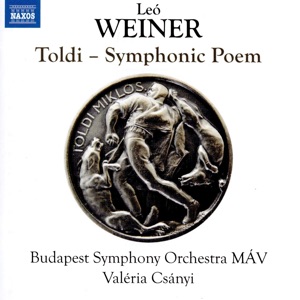Despite his eminence in Hungary as a teacher and mentor, Leó Weiner’s (1885-1960) music remained squarely in the 19th-century Romantic nationalist mainstream. Toldi is a symphonic poem in twelve separate movements lasting a bit more than an hour. The title character is a warrior who does all the stuff that warriors do. No need to get into the details. Based on a poem by János Arany, the work allegedly follows the text so closely that much of it consists of a type of instrumental recitative that fits the actual words. Perhaps that explains why the music is so uninteresting.
Weiner valued it very highly, even extracting two suites from the complete work, but perhaps there’s a reason it has been neglected for all this time. Yes, it’s intermittently tuneful, and contains a good measure of Hungarian-sounding motives, but the musical substance simply isn’t there to sustain the work’s length. Also, Weiner’s conservative basic idiom, the less than imaginative scoring, and the general sense of “been there, heard that” that permeates the work proves disappointing. Maybe you have to be Hungarian. Certainly the performance under Valéria Csányi is as committed as one could ask. The playing of the Budapest Symphony Orchestra is quite good, and the engineering clean and clear. Sadly, it’s just not that special musically.
































